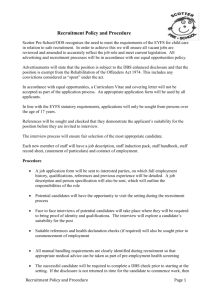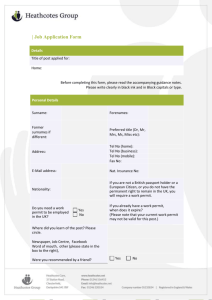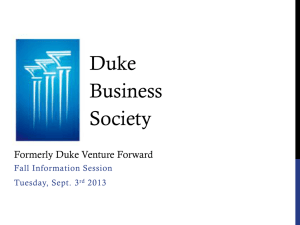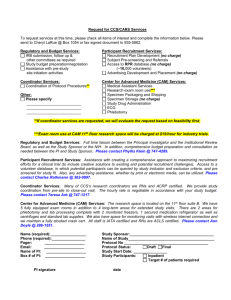Research Passport Assessment - School of Clinical Medicine
advertisement
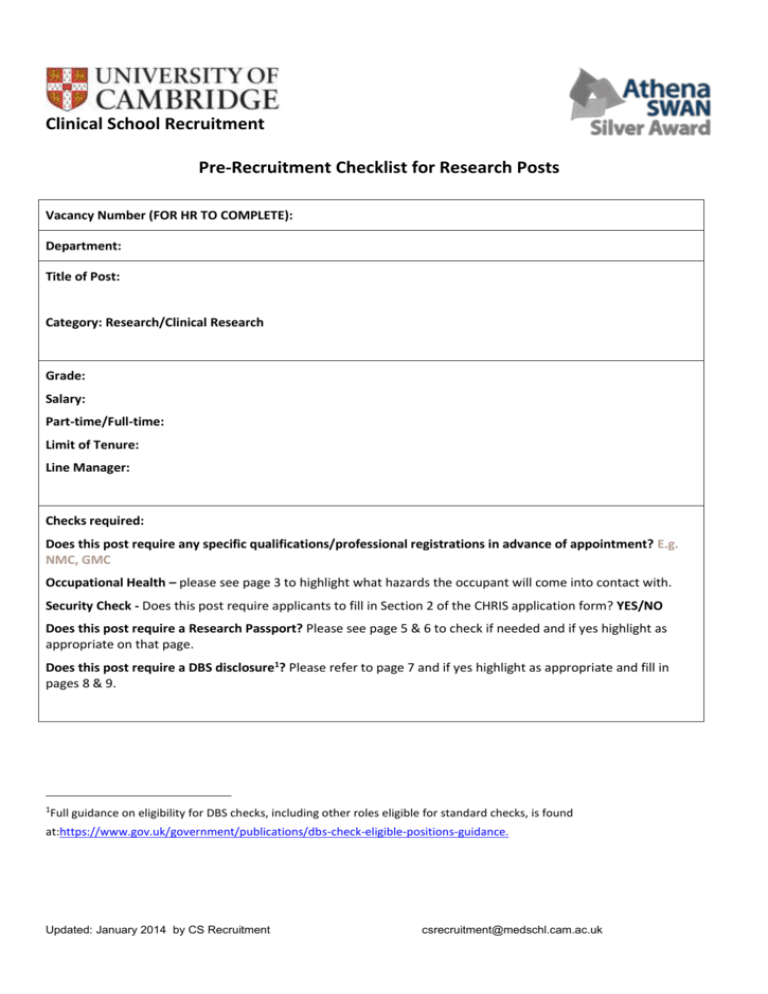
Clinical School Recruitment Pre-Recruitment Checklist for Research Posts Vacancy Number (FOR HR TO COMPLETE): Department: Title of Post: Category: Research/Clinical Research Grade: Salary: Part-time/Full-time: Limit of Tenure: Line Manager: Checks required: Does this post require any specific qualifications/professional registrations in advance of appointment? E.g. NMC, GMC Occupational Health – please see page 3 to highlight what hazards the occupant will come into contact with. Security Check - Does this post require applicants to fill in Section 2 of the CHRIS application form? YES/NO Does this post require a Research Passport? Please see page 5 & 6 to check if needed and if yes highlight as appropriate on that page. Does this post require a DBS disclosure1? Please refer to page 7 and if yes highlight as appropriate and fill in pages 8 & 9. 1 Full guidance on eligibility for DBS checks, including other roles eligible for standard checks, is found at:https://www.gov.uk/government/publications/dbs-check-eligible-positions-guidance. Updated: January 2014 by CS Recruitment csrecruitment@medschl.cam.ac.uk Page |2 Case of Need: This is a new grant funded position to support the Department and PI in [specific research area] Required to refill a post previously held by [previous occupant] as work is integral to the continuation of the work/study. Funding Code and type (Please specify Grant/ Central(UEF)/ Department): Research Grant Project Code Tsk Award (e.g. AAAG/001) (e.g. 01) (e.g. RG12345) Trans. Code % of funding From mm/yy To mm/yy (e.g. ABAE) / / Other Accounts Cost Code. % of funding Dpt CC SOF TRANS AA AABA ECAA ABAE 0000 From mm/yy To mm/yy 0000 0000 Advertising Media Publications in addition to University Job Pages, Reporter (for established posts) and Job Centre Plus Closing Date (please refer to attached guidelines) Interview Date: (must be minimum of nine days after shortlist is supplied to Recruitment Office): Additional documentation: Advert and Further Particulars - please attach and return with this checklist Updated: January 2014 by CS Recruitment csrecruitment@medschl.cam.ac.uk Page |3 Occupational Health/Job Hazard Evaluation Hazard Information Laboratory animal, animal and insect workers Yes No Include anyone who may have indirect contact,e.g, through location of office/laboratory in relation to the animal facility, include domestic (farm animals and birds). Enrolment on the Laboratory Animal Allergy (LAA) health surveillance programme will be necessary on commencement of employment. Means if the person will be intentionally culturing or handling cultures of Hazard Group 3 pathogens or GMOs classified as class 3 projects on the basis of their risk to human health. Give the name of the pathogen(s): An occupational health assessment is required prior to commencing this work. Deliberate handling of pathogens or GMOs in categories 3 Yes No Unscreened human tissue and/or blood Yes No Work with unscreened human tissue and/or blood. The new worker should either supply documented evidence of hepatitis B vaccination and immunity (immunisation date and serology date and result) or contact Occupational Health to arrange an appointment to commence a course of hepatitis B vaccination. Contact with patients Yes No Classified Radiation Work Yes No ‘Yes’ for staff working in clinical areas or laboratories where patients attend for investigation and research purposes and require a Research Passport. ‘No’ for staff based on hospital sites but with no direct contact with patients. Means work with radioactive substances or machine generators, that is, as confirmed by a University Radiation Protection Adviser, likely to result in the individual receiving, in any year, an ionising radiation dose three tenths that of any statutory radiation does limit. A medical assessment is required prior to commencing classified radiation work. Respiratory/Skin sensitisers Yes No Means as identified through risk assessment. Depending on exposure enrolment on the OH health surveillance programme may be necessary on commencement of employment. Toxic metals Yes No Driving Yes No Means as identified through risk assessment. Depending on exposure enrolment on the OH health surveillance programme may be necessary on commencement of employment. Use of mechanised pallet trucks/fork lifts trucks, University Messenger Service and Mini Bus drivers only. Harmful Noise Yes No Harmful hand arm vibration (HAVS) Yes No Night Work Yes No Means as identified through noise measurement assessment undertaken by the Safety Office. Depending on exposure enrolment on the OH health surveillance programme may be necessary on commencement of employment. Means as identified through HAVS measurement assessment undertaken by the Safety Office. Depending on exposure enrolment on the OH health surveillance programme may be necessary on commencement of employment. Means regular night work between 23:00hrs and 06:00hrs only not working late in the evening. Food Handling Yes No Means that the person’s work involves the preparation of uncooked food, eg chefs, not the handling of wrapped food, eg sandwiches and biscuits. Other work requiring health assessment Yes No Answer ‘yes’ if the job requires a specific health assessment to meet the requirements of a joint employer or work placement or specific infection control measures. Updated: January 2014 by CS Recruitment csrecruitment@medschl.cam.ac.uk Page |4 Advertising Resident Labour Market Test requirements If the successful applicant for your vacancy requires a Tier 2 Certificate of Sponsorship, you will normally need to meet the Resident Labour Market Test (i.e. to show that efforts were made to find a suitable person for the role who is already a settled worker in the UK but none was found). In practice, this means that the following must have been included in adverts in two UKBA approved media for your vacancy: Job title. Location of the job (e.g. Central Cambridge, West Cambridge). Salary range, or indication of salary package (including any guaranteed allowances or market supplements). Any terms of the offer such as limit of tenure. Main duties and responsibilities of the job. Essential skills, qualifications and experience required to perform the role. It is critical to identify all requirements which will be used as justification to the UKBA for selecting a non-EEA national or for rejecting EEA candidates (as required). The closing date for applications (this will appear automatically when an advert is generated through RAS). If your vacancy is an occupation which is below PhD level (i.e. not in a PhD level SOC code) and has a salary of less than £71,000 then your advert must be advertised on Universal Jobmatch (formerly known as Jobcentre Plus) and one other approved medium (e.g. the University's Job Opportunities pages, jobs.ac.uk or a medium which complies with the criteria set out in the UK Border Agency's sponsor guidance) for a minimum of 28 calendar days. If your vacancy is an occupation which is at PhD level or has a salary of £71,000 or more, you do not need to advertise in Universal Jobmatch to demonstrate the Resident Labour Market Test but you must advertise in at least two approved media (which include the University's Job Opportunities pages, jobs.ac.uk and media which comply with the criteria set out in the UK Border Agency's sponsor guidance). The University does however advise that a post is advertised for 30 days to cover any unforeseen circumstances (e.g. Jobcentre Plus can take 2 days to process the advert which would impact on the advertising period). Please note that if a Restricted Tier 2 Visa is required for the successful applicant, the application must be submitted to the Compliance Team on the last Friday of each month for submission to the Home Office by the 5th of the following month. The application will be considered on the 11th of that month and the outcome is declared within 5 days. Adverts for the position requiring the Tier 2 application are valid for 12 months if the job is at PhD level otherwise it is 6 months. Updated: January 2014 by CS Recruitment csrecruitment@medschl.cam.ac.uk Page |5 Research Passport Assessment Please highlight which of the following is applicable to this post: Activity Researcher is a health care professional providing health care to an adult and/or child Yes No Researcher provides health care to an adult and/or child under the direction or supervision of a health care professional Yes No Researcher provides personal care to an adult or child Researcher is a social care worker providing social work which is required in connection with any health care or social services to an adults who is a client or potential client Yes No Researcher undertakes the following activities unsupervised: teach, train, instruct, care for or supervise children, or provide advice/guidance on well-being, or drive a vehicle only for children; with likely direct bearing on the quality of care Yes No Yes, if done regularly this is Regulated Activity. Regular means carried out by the same person frequently (once a week or more) or on 4 or more days in a 30 day period or overnight between 2am and 6am Requires enhanced DBS + barred list check If yes, will there be direct contact with patients Yes No Researcher has opportunity for any form of contact with children in the same Children's Hospital (formerly a specified place) but is not providing healthcare or other types of regulated activity and has no direct bearing on the quality of care Yes No Yes, if done regularly enhanced DBS (preSept 2012 definition). No barred list check If yes, will there be direct contact with patients Yes No Updated: January 2014 by CS Recruitment csrecruitment@medschl.cam.ac.uk Page |6 Activity Researcher has access to persons in receipt of healthcare services in the course of their normal duties but is not providing health care or other types of regulated activity and has no direct bearing on the quality of care (‘Access’ relates to where individuals will have physical, direct contact with patients e.g. observation, qualitative interviews, focus groups) Yes No Researcher has indirect contact with patients or service users but is not providing healthcare or other types of Yes regulated activity and has no direct bearing on the quality No of care (e.g some types of telephone interview) Researcher requires access to identifiable patient data Yes derived from health records, tissues or organs with a likely No direct bearing on the quality of care If yes, will they be working with tissues or organs in NHS facilities Yes No Researcher requires access to identifiable patient data derived from health records, tissues or organs with no direct bearing on the quality of care Yes No If yes, will they be working with tissues or organs in NHS facilities Yes No Researcher requires access to anonymised patient data derived from health records, tissues or organs only (including by research staff analysing data) Yes No If yes, will they be working with tissues or organs in NHS facilities Yes No Researcher is working on NHS premises (e.g. laboratory) only (no access to identifiable data) Yes No If yes, will they be working with tissues or organs in NHS facilities Yes No Researcher requires direct contact with staff only but no access to patients (e.g. staff interviews) Yes No Updated: January 2014 by CS Recruitment csrecruitment@medschl.cam.ac.uk Page |7 Activity Researcher requires access to identifiable staff data only Yes No Researcher requires access to anonymised staff data only Yes No Eligibility for DBS Checks Please highlight check needed Type of DBS check required Type of Activity Regulated activity with children Teaching, training, instructing, caring for or supervising children or providing advice/guidance on wellbeing or driving a vehicle solely for children – this is on a regular 1 basis and is not supervised 2. Working as a paid employee in a specified place 3 (i.e. school, pupil referral unit, academies, nurseries, childcare premises, children’s detention centres, children’s homes, children’s centres) with the opportunity for contact with children – this is on a regular basis and may be supervised or unsupervised. Working as a volunteer in a specified place (see above) with the opportunity for contact with children where this is on a regular basis and is not supervised. Health care provided by, or under the direction or supervision of a regulated health care professional (please note that this only needs to be on one occasion to be regulated activity). Personal care involving hands-on physical assistance with washing and dressing, eating, drinking and toileting; prompting and supervising a child with any of these tasks because of their age, illness or disability; or teaching someone to do one of these tasks (please note that this only needs to be on one occasion to be regulated activity). Regulated activity with adults Healthcare provided by, or under the direction/supervision of a regulated health care professional. Personal care for adults involving hand-on physical assistance with washing and dressing, eating, drinking and toileting; prompting and supervising an adult with any of these tasks because of their age, illness or disability; or teaching someone to do one of these tasks. Provision by a social care worker of social work which is required in connection with any health services or social services. Assistance with an adult’s cash, bills or shopping because of their age, illness or disability arranged via a third party. Assisting in the conduct of an adult’s own affairs under a formal appointment. Conveying adults for reasons of age, illness or disability to, from, or between places, where they receive healthcare, personal care or social work arranged via a Yes No Yes No Yes No Yes No Enhanced DBS check with children’s barred list check Yes No Yes No Yes No Yes No Yes No Yes No Yes No 1 Enhanced DBS check with an adults’ barred list check, even if the role holder will only carry out the activity once Regular means carried out by the same person frequently (once a week or more) or on 4 or more days in a 30 day period or overnight between 2am and 6am. 2 Supervised means regular and day-to-day supervision by someone who is in regulated activity. See http://www.homeoffice.gov.uk/agenciespublicbodies/crb/about-crb/crb-pofa-2012/ra-children/ for further details 3 The individual must be an employee of the specified place rather than a University employee conducting some work within a specified place, e.g. as a visitor. This option is expected to apply rarely within the University. Updated: January 2014 by CS Recruitment csrecruitment@medschl.cam.ac.uk Page |8 third party. Supervising regulated activity Day-to-day management or supervision of any person engaging in any of the regulated activities listed above. Yes No Enhanced DBS with the appropriate barred list check Formerly Regulated Activity Does the role involve activities which were deemed to be regulated activity before the coming into force of Section 64 of the Protection of Freedoms Act on 10 September 2012? 1 If you believe activity in your post comes under this section, please indicate in the box at the top of page 8. Health Care (where not carrying out regulated activity) Employment or other work concerned with the provision of health services and which is of a kind as to enable the individual concerned to have access 2 to persons in receipt of such services in thecourse of his/her normal duties. Yes No Yes No Enhanced DBS check with no barred list check Standard DBS check DBS Form Please complete this section where a DBS is needed for the post. 1. In the box below, please provide a summary of the duties of the role which you believe create eligibility for a DBS check and how frequently they will be carried out (e.g. “The role holder will teach children at least once per week and will not be supervised”). Alternatively, please attach a role description or HR7 Further Information document and highlight the relevant section. Risk Assessment for New Employees 2. Is it a regulatory requirement of a professional body that the post holder cannot commence employment prior to checks being cleared? Yes No If yes, please go to Question 5 and ensure that the DBS check requirement for this post has been recorded as ‘Essential’ in CHRIS3. If no, please go to Question 3. 3. Would the department/institution like the new employee to be able to start work if his/her DBS check has not been completed before the intended start date?4 1 Examples of this are teaching, training, instructing, caring for or supervising vulnerable adults/children on a frequent/intensive basis whilst being supervised; working as a supervised volunteer in a specified place on a frequent/intensive basis; working in adult care home or children’s hospital with the opportunity for contact with vulnerable adults/children on a frequent/intensive basis. Schedule 4 of the 2006 Act provides full definitions - see http://www.legislation.gov.uk/ukpga/2006/47/schedule/4/enacted. 2 Access relates to physical, direct contact with patients e.g. observation, interviews, focus groups. 3 Please see http://www.admin.cam.ac.uk/cam-only/offices/hr/recruitment/vacancy/checks.html for further details Please note, you should answer ‘Yes’ only if any delay in the new employee’s start date will have a significant impact on operational delivery. 4 Updated: January 2014 by CS Recruitment csrecruitment@medschl.cam.ac.uk Page |9 Yes No If yes, please go to Question 5 and ensure that the DBS check requirement for this post has not been recorded as ‘Essential’ in CHRIS. If no, please go to Question 5 and ensure that the DBS check requirement for this post has been recorded as ‘Essential’ in CHRIS. 4. What risk minimisation/avoidance measures will be put in place until the DBS check has been completed? Please tick as applicable and provide any further information in the box provided: The new employee will not carry out any of the duties that create eligibility for a DBS check The new employee will be supervised at all times when carrying out any duties that create eligibility for a DBS check Other – please provide details in the box below 5. Has the new employee disclosed any criminal convictions, cautions, reprimands, warnings or pending police investigations? Yes No If yes, please complete a HR20. 6. Have you obtained references in line with University policy? High risk – Referees declare applicant unsuitable Medium risk – Referees share some reservation or no references obtained Low – Referees declare applicant suitable Risk Assessment Decision To be completed by the Recruitment Services Manager or nominated deputy only. I confirm that the new employee may start work prior to his/her DBS check being completed based on the information provided by the department/institution. I confirm that the new employee may not start work prior to his/her DBS check being completed based on the information provided by the department/institution. Name Title Signature Date Updated: January 2014 by CS Recruitment csrecruitment@medschl.cam.ac.uk P a g e | 10 Section E – Line Manager Confirmation I confirm that the information provided in this form is complete and accurate and that I will ensure that any risk minimisation/avoidance measures specified in Question 4 will be implemented. Name Title Signature Date Updated: January 2014 by CS Recruitment csrecruitment@medschl.cam.ac.uk
